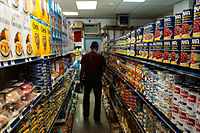
Photo from wikipedia
To characterize experiences of stress and food insecurity among participants of a clinic-based nutrition education and food security intervention program, Georgia Food for Health (GF4H). We conducted semi-structured interviews with… Click to show full abstract
To characterize experiences of stress and food insecurity among participants of a clinic-based nutrition education and food security intervention program, Georgia Food for Health (GF4H). We conducted semi-structured interviews with 17 patient participants. Participants were mainly middle-aged (mean age 59 years), African American (100%), and women (59%). Participants were asked questions around program structure, stress sources and stress management techniques, and how they make decisions around eating while stressed. Transcripts of interviews were analyzed for both apriori and emergent themes. Participants discussed several key sources of stress with the most common being family stress and financial stress. For many, financial trade-offs such as paying a bill rather than buying food were counteracted with reliance on community and social resources to make ends meet. Participants described stress as a barrier to healthy eating by limiting willpower and discussed how the nutrition education received in the program was important for making healthy decisions more often. Participants enjoyed the social aspects of the program and continue to connect with those they met to discuss recipes and healthy eating strategies. Stress management techniques discussed primarily included social interactions, religious activities, and distracting activities such as games and television. Some participants discussed an alternative response to stress and how they avoid internalizing the feeling. Our findings highlight the complexity of experience for participants of interventions targeting food security. Participants are juggling responsibilities and managing a variety of stressors. However, the nutrition education provided through the program appeared to raise awareness of health and aid participants in making healthy diet choices. Supported partially by the National Center for Advancing Translational Sciences of the National Institutes of Health under Award Number UL1TR002378. The content is solely the responsibility of the authors and does not necessarily represent the official views of the National Institutes of Health.
Journal Title: Current Developments in Nutrition
Year Published: 2021
Link to full text (if available)
Share on Social Media: Sign Up to like & get
recommendations!